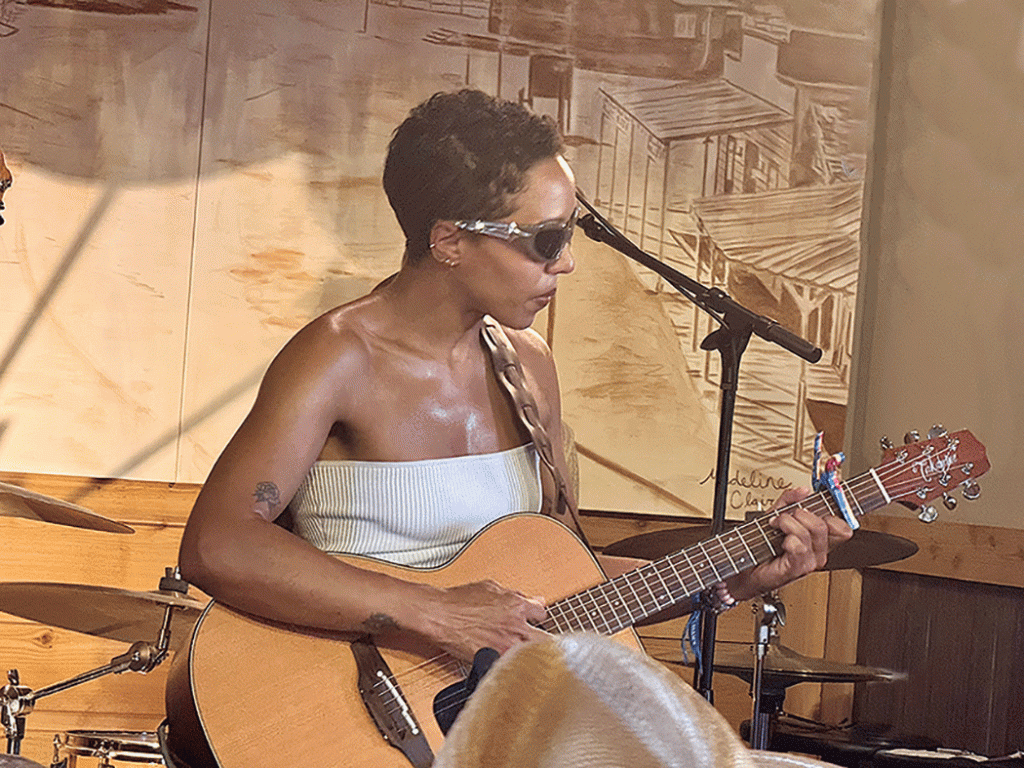
Lizzie No is both a musician and a political activist, and she doesn’t see a difference be-tween these roles. The job of the artist is to help people see their place in the world more clearly. As a queer Black woman and a self-described communist working in the larger white folk-country-Americana field, Lizzie No understands her very presence is a political statement.
That’s one of the reasons Lizzie Quinlan took the name Lizzie No. She joked that it originated when she was a mischievous child whose parents were always telling her “Lizzie, no.” She later took the moniker as a badge of honor for her unwillingness to accept the world’s negation of her identity. She was not going to do what others told her she could or could not do. She was going to define herself and create a space for others. Lizzie No advocates on behalf of LGBTQ issues, reproductive choice, and racial equality.
Musically, Lizzie No has released three critically acclaimed full-length albums and performed across the United Kingdom, Europe, and America, including gigs at the Newport Folk Festival, AmericanaFest and South by Southwest. Rolling Stone magazine named her one of their “Future 25” artists of the year, and her song “The Heartbreak Store” was nominated for International Song of the Year at the recent Americana UK awards. She will perform an “intimate on-stage seating event” at the Englert Theatre on July 18 that features her and her three bandmates sitting together on stage with approximately 50 audience members.
Her music defies labeling. She’s a singer-songwriter who rocks, plays folk, and loves country, and whose sound incorporates bluegrass, blues, and jazz riffs. “Musicians normally don’t think of themselves in terms of genre,” she said over the phone from her North Nashville home. “That’s something the suits do so they can put it on shelves and sell it.” She describes her own early influences as TV on the Radio, Elliott Smith, My Chemical Romance, and the Indigo Girls, as well as poets Langston Hughes and Terrance Hayes and novelists Toni Morrison and Gabriel Garcia Marquez. Lizzie No graduated from Stanford University with a degree in comparative literature.
“In terms of my own music, I tend to write the music and the lyrics at the same time. I get into a zone or environment where I can create—a space, like the one Virginia Woolf writes about in A Room of One’s Own,” she explained. “Writing music is not the kind of work one can force oneself to do, but one has to be free enough to do so.”
Lizzie No was born in New York City and raised in Princeton, New Jersey. She acknowledges that her music would be different if she came from Iowa or anywhere else. “You grab from what’s around you,” she said, “even if it is from pushing against those limitations.” She believes that the artist’s responsibility is to understand what is possible.
“I am more comfortable on stage than anywhere else. I created the character Lizzie No as a way to be on stage and take up space telling stories and sharing feelings,” she said. And it’s not just about being entertaining. She finds that her calling as a troubadour requires the sensitivity to point out when something seems wrong or to praise when something seems right. “To be truth telling,” she said, but to express it in a way that one can dance to or sing along with.
The songs on Lizzie No’s most recent album, Halfsies, take on the form of “an aural video game.” She clarified, “The listener goes on a journey from alienation to freedom in a quantum time where past, present, and future all exist at the same moment.” While she admits that this can be difficult to comprehend conceptually, she lets the songs speak for themselves. Some cuts rock out, others are tender, and most contain elements of humor and empathy. One does not have to understand where they each fit in the story line to appreciate their artfulness. Each one is a gem whose narrative is self-contained.
“The album took a long period to make, and there are many songs that didn’t get selected for inclusion because they did not fit the theme,” Lizzie No said. “It is very much a picture of America in the present and as part of its historic conditions.”
The last song, called “Babylon,” is a beautiful recreation of Psalm 137, the one in the King James Bible that begins with the line “By the rivers of Babylon, there we sat down, yea, we wept when we remembered Zion.” The original ends with the Israelites unable to sing out of homesickness for the promised land. Lizzie No’s song finds her character caught between the devil and the deep blue sea, and fleeing Babylon for a better world.
When asked if that meant that today’s America was a modern-day Babylon, Lizzie No demurred from answering directly. This was not because she is shy—in fact, she has strong opinions and boldly proclaims them—but because she believes audiences need to process the music and create their own meanings.
